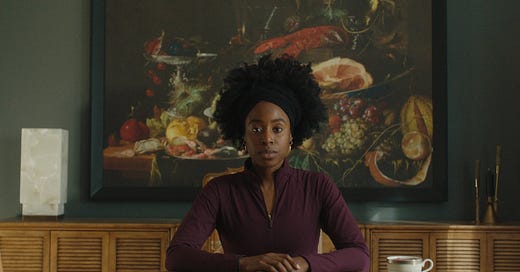Heartland: We Strangers
Kirby Howell-Baptiste plays a house cleaner who cons some rich white ladies into thinking she's a psychic in this provocative rumination on race and class.
For Heartland Film Festival schedule and tickets, please click here.
Nowadays I like to think most people are more sensitive to issues of race and class than they used to be. Often that’s contained to just empty gestures, but acknowledgement of our divisions is at least a first baby step in addressing them. So we are more open to noticing stuff like the people who do things like cleaning are predominantly Black and brown.
“We Strangers” goes a step further, exploring race and class in a way that’s more provocative but still subtle and layered.
It’s about a Black woman who cleans for a living and sort of falls backward into conning some rich white ladies into thinking she’s a psychic. At first she just does it for a few bucks and yuks, but then she’s forced to continue the charade and it gains her entry into a world of privilege she’s never experienced before, which is both tantalizing and forbidding.
Writer/director Anu Valia is a Hoosier from The Region, as we like to call the northwest corner of Indiana that is essentially part of the Greater Chicago area, raised as a member of a Sikh family, so no doubt she knows what it is to feel otherized. She’s built an impressive resume as a producer, actress and director on TV and streaming shows, including helming three episodes of Marvel’s severely underappreciated “She-Hulk: Attorney at Law.”
Valia approaches the material not with an explicit agenda — people of color good, white folks bad — but more as an exploratory rumination on divergent cultures, asking whether we can all truly know each other. If the film’s theme is somewhat pessimistic on that front, it least offers a humanistic portrait of people as three-dimensional and questioning.
Kirby Howell-Baptiste plays Raelle (Ray) Martin, a woman I’d guess in her 30s who has a teen kid and her mother living with them. Her mom (Tina Lifford) works long hours at a grocery store while she toils as an office cleaner.
While helping empty out the medical officers of a podiatrist, Dr. Niraj Patel (Hari Dhillon), he offers to have Ray clean his house on a private basis. Something lingers in their glances between each other, and I kept wondering if more would happen between these two characters.
Instead, the new relationships that emerge are with the doctor’s wife, Tracy (Sarah Goldberg), and their neighbor, Jean (Maria Dizzia), a nosy sort whom Ray first encounters peering into the windows because she suspects Ray is a miscreant of some sort. Perhaps out of a sense of guilt, Jean invites Ray to start cleaning her house, too.
Tracy and Jean aren’t bad people per se, but live inside bubbles they can’t see and wrapped in privileges they don’t feel. Neither seems to work and has plenty of free time to clean their own houses, but having someone else do it for you is just part of the life they’ve come to expect.
While watching something about psychics on TV, Ray says in passing that it’s something she can do, too. As something of a lark, Jean asks her to do a reading, which Ray obliges, and says some things that are close enough to the mark to earn Jean’s trust.
Ray isn’t psychic, but is smart and observant, and by being around these women, their homes and families, she’s able to zero in on their foibles and anxieties, and pick away at these weaknesses in a way that seems like she’s helping them. Soon they’re paying her $100 a pop for readings, and generating interest in the other women in their affluent community.
Tracy is the more outwardly skeptical of the two, someone who has adapted to her status by becoming more hard-hearted, rather than like Jean who at least seems somewhat apologetic about her wealth and leisure. “I've always been interested in getting someone to do whatever I want,” Jean mutters in one unguarded moment.
But Ray pokes around Tracy’s shell long enough to find the soft spots, and before she knows it has spurred her client to some unexpected acting out.
Things go on from there. Ray finds herself in a low-level beef with Tracy’s daughter, a spoiled rich kid who takes every opportunity to remind Ray that she is “the help.”
In addition to straight narrative scenes, Valia layers in imagery and sequences that hover someone between dream and vision. For instance, a recurring story that’s referenced is the eruption of Mount Pelée, when the volcano supposedly killed everyone in the town below except for the man who was held in an underground prison.
So as Ray is experiencing some confusion/resentment in her dealings with these women, the view will cut away to the mountain — part warning, part desire. Ray may occupy a much lower wrung on the socioeconomic ladder than Jean and Tracy, but that’s also forced her to become more of a survivor.
There’s also a trove of subtext in the few scenes between Ray and Jean’s husband, Ed (Paul Adelstein), a gas & oil executive whose hobby is taking pictures of American flags from every state he’s visited and arranging them into a patriotic wall display. It’s a quietly powerful clash of cultures.
Howell-Baptiste is an intriguing figure as Ray, straddling two worlds and just grabbing whatever opportunities present themselves to get ahead. Both admirable and sometimes disappointing in her behavior, she is a flawed and authentic protagonist.
“We Strangers” may not have a fully developed narrative through-line, but I admired its willingness to be the sort of movie that asks uncomfortable questions without feeling the need to provide pat answers.





